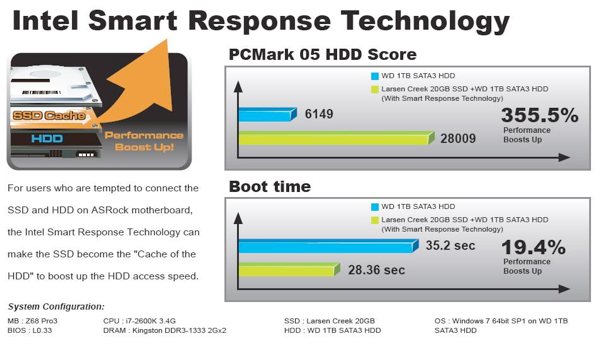Intel's new Z68 chipset is slated to arrive in the first half of May as a hybrid between the P67 and the H67. Besides allowing better CPU overclocking and enabling the Quick Sync transcoding technology that is embedded into Sandy Bridge processors, this LGA 1155 high-end chipset is introducing something called 'Smart Response Technology'.
In a nutshell, Smart Response Technology is a caching function that would boost system performance by marrying a conventional hard drive to a relatively small solid-state drive. Unlike just adding a boot drive for the operating system and applications, Intel's new caching feature automatically moves only the most frequently-accessed data onto the SSD for fast access while the two drives appear to users simply as a single drive.

As motherboard makers get ready to launch their Z68-based products some juicy information has come to light. The above image was pulled from a PDF flyer for the ASRock Z68 Extreme4 motherboard, and spills the beans on an upcoming "Larsen Creek" SSD from Intel apparently made for use within an SRT-based setup.
It's rather small at 20GB – and thus we expect it to be relatively affordable – but is large enough to store a plenty of frequently used files. In terms of performance it is said to provide a 355% boost in the PCMark 05 HDD Score when paired with a standard 1TB hard drive (compared to the 1TB drive alone) and will improve boot time by up to 19.4%.
Of course, SRT should work with any SSD, but the addition of a very affordable option on Intel's lineup might give the feature a welcome boost. It will be interesting to see how hybrid hard drives like Seagate's Momentus XT – which also carry magnetic platters and flash memory chips – compare against Intel's solution in both price and performance.